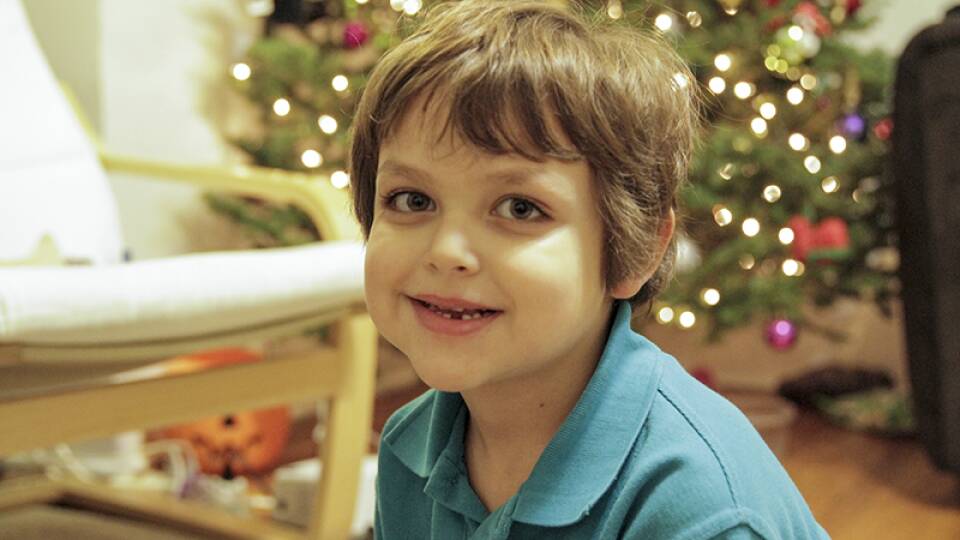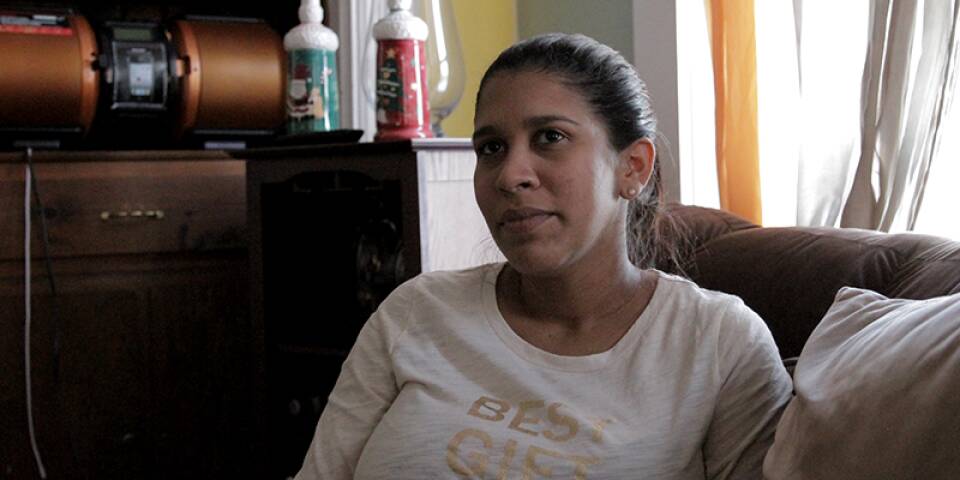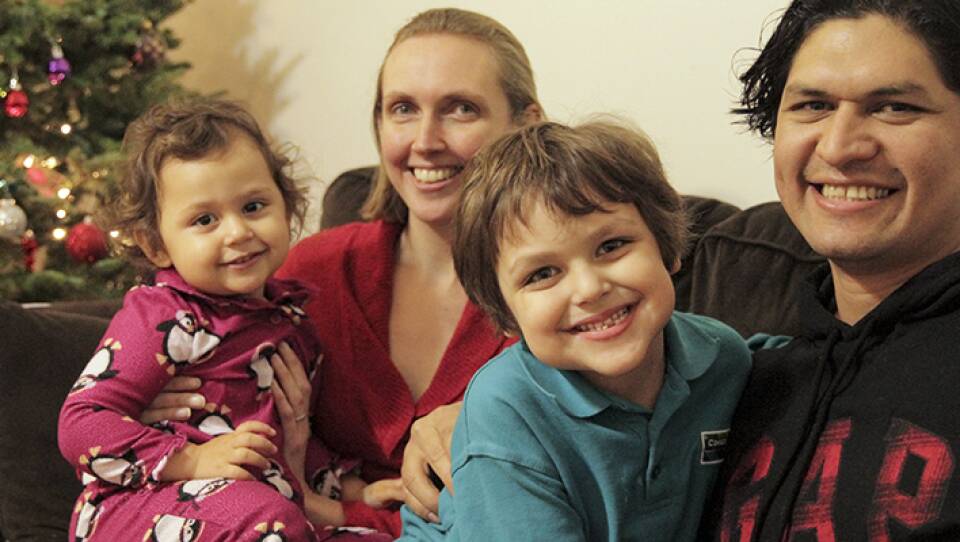A brightly decorated Christmas tree blinks in one corner of the children’s playroom, and in front of it, Samuel and Gabriella Diaz are sitting on the floor, surrounded by a colorful array of toys. Two-year-old Gabriella, dressed in pink flannel penguin pajamas, squeals happily as she pulls a wooden duck on wheels behind her. Her older brother Samuel, who is five, carefully guides a plastic Spiderman through the air.
You would never know from watching them play, but both Gabriella and Samuel have asthma. Samuel’s case, in particular, is severe. He has had flare ups that have landed him in the emergency room, and if he gets a cold, or if the outside temperature drops too low, his symptoms get worse. He missed five weeks of school last winter, and he has to use a nebulizer every morning to stay healthy.
Gabriella and Samuel’s mom, Erin, works for a nonprofit organization that helps high school students who will be the first in their families to go to college. Their dad, Darwin, is a carpenter.
Neither of their workplaces offer health insurance. Their family income is higher than would qualify them for Medicaid – the joint federal and state health coverage program for low-income residents – but it’s not enough for them to be able to afford other insurance.
That’s where CHIP, the Children’s Health Insurance Plan, comes in.
“[CHIP] covers absolutely everything that they need. Their medicines, check-ups, ER visits, which we try to avoid, but sometimes you can’t avoid them,” said Erin.

CHIP, a program created in 1997 under bipartisan legislation sponsored by Senators Orrin Hatch (R- Utah) and Ted Kennedy (D-Mass.), covers nearly nine million children nationwide, most of whom are in the same situation as the Diaz family. They make too much money to be eligible for Medicaid, but not enough to be able to afford other insurance. The roughly $15 billion program is funded through a combination of federal and state funds.
CHIP has been making national headlines since September 30, when federal funding for the program expired. Congress has not renewed funding, causing anxiety and uncertainty for the families it covers, and sending state leaders scrambling to make contingency plans.
Some states, including Colorado, Utah, and most recently, Connecticut, are already sending notices to CHIP recipients, warning them that their coverage could end if Congress does not renew funding. Alabama announced this week it would freeze its enrollment starting Jan. 1, if Congress doesn’t reauthorize funding.
According to the state’s most recent numbers, CHIP covers 172,000 people in Massachusetts. The state has estimated that it would run out of federal funds for CHIP by mid-January if Congress doesn’t act.
But last week state officials said that they plan to roll some children currently covered through CHIP into Medicaid, in order to stretch its CHIP dollars through the end of the fiscal year. This change would allow for everyone in the state currently covered by CHIP to be covered through the end of June.
Because of this and other steps the state has taken to mitigate the effects of losing federal dollars, CHIP recipients like the Diaz family are more likely than recipients in some other states to retain their coverage, at least for now.
But without the renewal of federal funds, the program’s long-term future — along with the future for those it covers, even in a state known for its dedication to healthcare — is far from certain.
According to a report by the Blue Cross Blue Shield of Massachusetts Foundation, if federal CHIP funding disappears, most children now covered by CHIP would be able to remain covered under MassHealth — the state’s health insurance program for low-income residents, which currently includes Massachusetts’ Medicaid and CHIP programs. This is due to a provision in the Affordable Care Act, which protects a portion of these children from losing insurance, and a waiver under which Massachusetts’ Medicaid program operates, which allows for others currently covered by CHIP to become covered by Medicaid.
These changes, however, would still place a financial burden on the state. The federal government reimburses the state for 88 percent of CHIP costs, but generally only 50 percent of Medicaid costs, according to the report. If CHIP children become covered by Medicaid, the state would need to fill in that gap.
CHIP also covers approximately 5,000 pregnant women in Massachusetts – according to the state’s most recent numbers – who are not eligible for Medicaid because of their immigration status, but receive coverage for prenatal and postnatal care through their unborn children. If the state takes action to stretch its CHIP dollars through June, these women would keep their health care coverage until the end of the fiscal year. What would happen after that is uncertain.
Pregnant women currently covered by CHIP through their unborn children are most at risk of losing their insurance, according to the Blue Cross Blue Shield Foundation’s report.
Stephany Rodriguez-Plasencia is one of these women.
Rodriguez-Plasencia, 28, is five months pregnant, and she is not eligible for Medicaid because the program requires recipients to have held green cards for more than five years. She arrived in the U.S. only weeks ago – on Dec. 1 – from the Dominican Republic, but though she is here legally, she is still years away from qualifying for the program.
Sitting in her living room in her apartment in Haverhill, the front door marked by her country’s flag, she describes the seven-year wait for a visa so that she could join her dad and her sister in in the U.S. She had never anticipated that when her application was finally approved, she’d be pregnant.
“I was really very worried,” she said. “You don’t know if you’re going to be able to get the services you need.”
She had her first doctor’s appointment in the U.S. last week and said she is relieved that she is getting high-quality care. She beams as she talks about the future for her baby-to-be, whom she has named Alonzo.
“I want him to be healthy,” she says, “I want him to be healthy and happy.”

Massachusetts State Senator Barbara L’Italien of Andover introduced a bill at the beginning of 2017 that would further protect women like Rodriguez-Plasencia, and families like the Diaz family, from losing coverage.
If passed, the bill would require the state to continue covering everyone currently covered through CHIP, said L’Italien, who is also running for Congress in 2018.
The bill had a hearing before the Joint Committee on Health Care Financing on May 2, and they are waiting to see whether they will need to move the bill forward, depending on whether the federal government reauthorizes funding, she said.
“That's a discussion for the Senate president, the speaker, the governor,” she said. “Hopefully they will all be on the same page and in agreement that this is something that needs to be covered and it needs to be prioritized.”
But here’s the catch to all of these efforts: None of the safeguards the state is attempting to put in place changes the financial impact of the lack of federal funds.
L’Italien says the state would have to find $147 million to fund the program for the remainder of the fiscal year and $295 million to fund it fully next year.
And this budget strain is a challenge, says Audrey Shelto, president of the Blue Cross Blue Shield of Massachusetts Foundation.
“It really puts the state in a jam,” said Shelto, adding that there are really only three “levers” that the state has to work with to ease the burden.
“There's enrollment – you could reduce the number of people who are eligible,” she said. “There are benefits – you could reduce the breadth of benefits and therefore the cost of covering people. Or there are provider rates – you could reduce what you pay providers, and therefore reduce the cost of the program. But that's really all they have to work with.”
Gov. Charlie Baker has been advocating for Congress to reauthorize federal funding. On Nov. 29, he and Oregon Gov. Kate Brown sent a letter to congressional leadership on behalf of the National Governors Association, urging “immediate action” on CHIP.
“These disruptions have not been without consequences, and we write to convey that further delay into 2018 will only compound the issues facing our states and vulnerable citizens,” they wrote. Baker also co-wrote an op-ed in the New York Times on Dec. 7, stating that “any day now, if Congress doesn’t act, these kids could lose the health care they depend on.”
But if Congress doesn’t respond to these pleas, L’Italien says the state footing the bill would be well worth the cost.
“There may be a lot of tough and hard choices coming down the road if the Feds continue to step away from some of the commitments that they’ve made with healthcare,” she said. “In my opinion, covering pregnant women and low-income children and ensuring they have healthcare really is a core service of government.”
Experts say they hope such legislation will not be necessary, as they still hold out hope that Congress will reauthorize funding. Many have speculated CHIP funding could be rolled into the federal budget process, which is facing a Dec. 22 deadline to avoid a government shutdown.
And Congress has made some progress — the House passed a bill on Nov. 3 to reauthorize CHIP funding, and a bill has made it through committee in the Senate, though it has not been brought to the floor for a vote.
But Suzanne Curry, associate director of policy and government relations at the nonprofit organization Health Care For All, says she’s worried that the Republican tax bill that Congress is seemingly on the verge of passing could have negative implications for CHIP and other important health programs.
“I think the fact that the tax bill increases the federal deficit by $1.4 trillion definitely does not help in funding any of the programs that we care about,” she said. “Unfortunately, from our view, you're doing a disservice to the people who need the services, and you're benefiting the people who really don't need the additional help.”
And even if Congress does eventually refund the program, this level of uncertainty, which has now plagued states and program recipients for nearly three months, can have a negative impact on state enrollment and on the programs themselves, says Tricia Brooks, a senior fellow at the Center for Children and Families at Georgetown University.
“Even getting a notice [saying that coverage might end] that's rescinded later can have a chilling effect on enrollment,” she said. “Now 95 percent of children in this country have health coverage. I don't want to see us do a U-turn on that, but I'm afraid that if Congress doesn't act by the end of the year, that indeed we're going to see those gains slipping.”
Erin Diaz, Samuel and Gabriella’s mom, has followed the issue, and she says she is unsure what the lack of renewed funding might mean for her family.
“I don’t think any of us want to go back to the days where all these kids would just be turned away at a doctor’s visit, or at a hospital for critical care that is going to keep them healthy…and potentially save their lives,” she said. “If they can’t find another way to fund [CHIP], I don’t know what else they could do, except for cut the program.”





